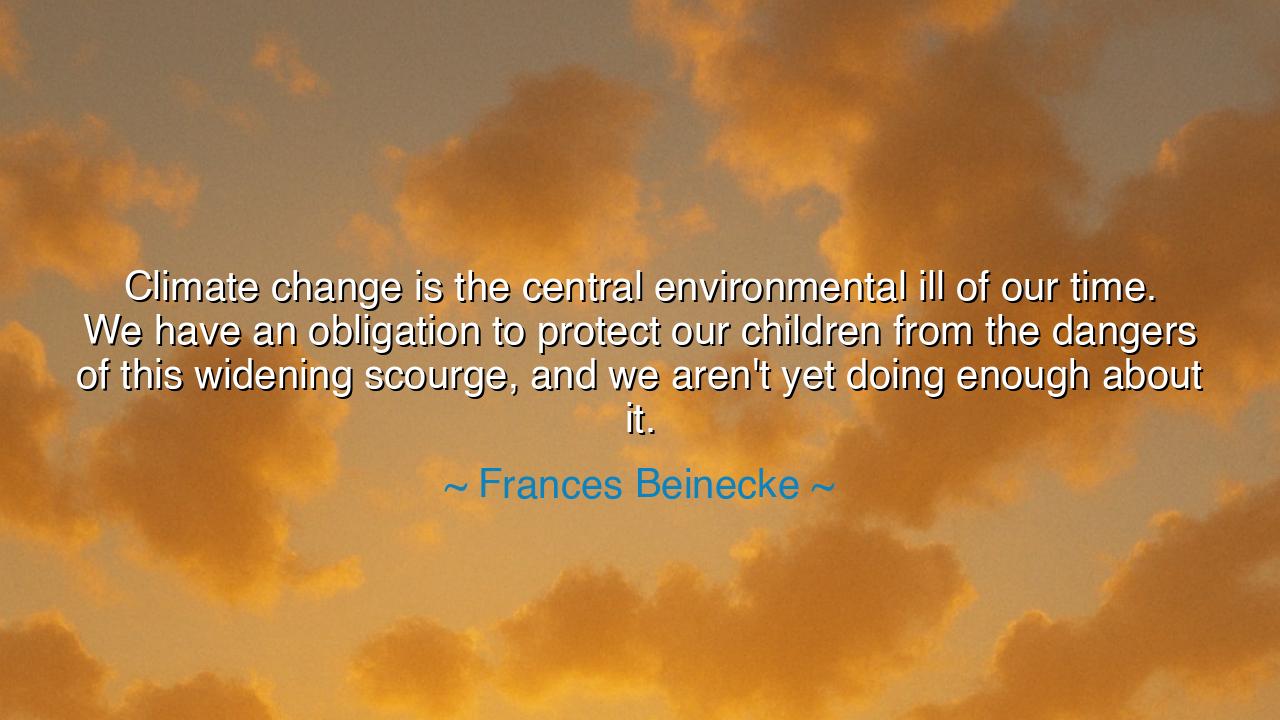
Climate change is the central environmental ill of our time. We
Climate change is the central environmental ill of our time. We have an obligation to protect our children from the dangers of this widening scourge, and we aren't yet doing enough about it.






Hear the solemn words of Frances Beinecke, spoken with the gravity of one who has seen the storm gathering on the horizon: “Climate change is the central environmental ill of our time. We have an obligation to protect our children from the dangers of this widening scourge, and we aren't yet doing enough about it.” This is no ordinary warning, but the cry of a guardian who calls us to awaken before the earth itself becomes hostile to its own children. Her words are a summons, urging us to act not for profit, not for convenience, but for the survival of generations yet unborn.
She names climate change as the central ill, for it is the root from which countless afflictions spring. Floods and droughts, famine and fire, storms that shatter cities, and seas that swallow coasts—all are threads woven into the same dark tapestry. Where once man battled isolated disasters, now he faces a force vast and unrelenting, shaped by his own hands through smoke, industry, and neglect. To recognize this truth is to face the bitter reality that we are both the cause of the plague and the only cure it may know.
Beinecke calls it an obligation to protect our children. This is not a task for the distant future, but a present duty. In every culture of the ancients, it was held sacred that the elders must prepare the world for those who come after. The Iroquois spoke of making decisions with seven generations in mind; the farmers of old sowed trees whose shade they themselves would never rest beneath. To fail in this duty is to break the covenant of humanity, to consume the inheritance of the young so that the old may live in fleeting comfort.
History offers us a mirror. In the Dust Bowl of the 1930s, vast lands of the American plains, once fertile and green, were stripped barren by reckless farming and neglect of nature’s limits. Families fled as black winds of dust swallowed the sun. Children coughed and starved while their elders mourned the folly that had brought ruin upon them. And yet, from that devastation came change: new farming methods, soil conservation, and an awakening to the truth that the land must be treated with reverence. So too must we now awaken to the perils of climate change, lest our own age reap storms of even greater fury.
Beinecke declares with sorrow that we aren’t yet doing enough. Nations make promises, but emissions rise. Leaders speak of action, but forests fall. Technology advances, yet greed consumes its promise. It is the same story told through ages: men know the danger, but delay until the danger overwhelms them. Thus, her words strike with urgency—this is not the time for silence or half-measures, but for courage, sacrifice, and resolve.
What lesson must future generations draw from this teaching? It is this: that survival depends not only on knowledge, but on will. We have long known the science of warming seas and rising skies, yet knowledge without action is as useless as a map unheeded by a wandering traveler. Each of us must take up this obligation: to demand justice from leaders, to change our habits, to cherish energy, water, and land as sacred trusts, not limitless supplies. Every act of care is a shield for the children, every act of neglect a dagger in their hands.
To you, listener of these words, I say: live as guardians, not consumers. Support those who build with the earth in mind, not against it. Plant trees where there are none, preserve waters where they run dry, choose paths of restraint over indulgence. Teach your children reverence for creation, so they may inherit not ashes, but abundance. And when you speak of climate, speak with urgency and hope, for despair is the ally of inaction, but hope is the spark that ignites change.
Let Frances Beinecke’s voice be heard across generations: climate change is the scourge of our time, but it need not be the death of our future. If we honor our obligation, if we rise with courage and foresight, we may yet pass to our children a world where they not only survive, but thrive. But if we delay, their future will judge us not with sympathy, but with sorrow. Choose, then, to act, that the story of this age may be one of awakening, not collapse.






AAdministratorAdministrator
Welcome, honored guests. Please leave a comment, we will respond soon